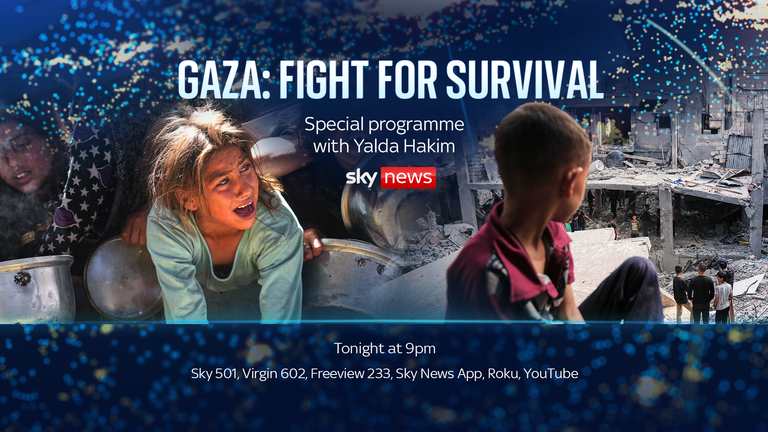In Gaza, the frontline is not just where the bombs fall – it’s where the ambulances arrive.
When an Israeli airstrike hit a busy market in Gaza City today, people were queuing for flour.
Minutes later, medics were picking up body parts. The bodies were heaved onto stretchers, mutilated limbs twisted unnaturally. Blood soaked the concrete.
Israel-Gaza latest: Netanyahu reportedly accepts US ceasefire plan
Sky News has spent several days filming with emergency crews based at Shifa Hospital, Gaza’s largest medical complex and one that has itself come under repeated attack.
There are few paramedics left, and fewer ambulances. Fuel is low. Equipment is basic. They operate in one of the most dangerous places in the world, where the medics themselves are no longer spared.
“There is no safety”, says Hamdallah Ali Daher, a paramedic from Jabalia Camp in northern Gaza.
“When we respond to a strike, drones are still overhead. They targeted my colleague in one of our vehicles. You could be walking any day and get hit.”
The danger is constant. Daher describes how they operate under the hum of drones, often arriving at scenes where smoke still rises from the wreckage. “We go out risking life and limb”, he says. “We carry our coffins with us.”
????Listen to The World with Richard Engel and Yalda Hakim on your podcast app????
One of his colleagues, Alaa al-Hadidi, was killed in a drone strike in December last year. His fellow medics buried him. Israel has accused Hamas of using ambulances to move around Gaza disguised.
Wael Eleywa, another paramedic, has worked throughout the more than 600 days of war.
“What affects us the most is the children”, he says. “After a mission, you begin to imagine the injured children as your own relatives. These images stay with you and get mixed in your mind.”
“Some of us have had to pull family members from the rubble.”
Read more:
Charity calls government to rescue two children in Gaza
Gaza doctor’s nine children killed
How the new Gaza aid rollout collapsed
He describes responding to scenes where tents have caught fire after a strike – children burned inside. “There’s no mental peace in this job”, he adds. “But the work still needs to be done.”
The war, now nearing its twentieth month, has severely degraded Gaza’s emergency response network.
Many hospitals are no longer functioning. The roads are dangerous or impassable. The strikes come during the day and in the dark of night. Combat zones shift daily.
“There is no protocol anymore”, Eleywa says. “We are medics in name, but the occupation doesn’t distinguish between civilians, or paramedics or anyone else. Even with permits, they detain or target us.”
Daher echoes the plea: “To all people, to all organisations – we need protection. We are trying to provide safety in a place where safety can’t exist.”
Despite the horror, there is also resolve. “We lean on and support each other as colleagues”, says Daher. “Before the strikes, we’re often together laughing, trying to lift each other up. Then the call comes, and we go.”
The medics speak with the matter-of-fact calm of those who have seen too much. As they race between ruins and hospitals, they know that each shift could be their last.
“In this field of work”, Eleywa says, “we prepare for the worst, and go. Safety is out of reach.”
This story originally appeared on Skynews





